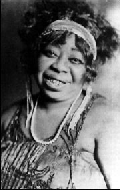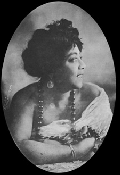- A Patriarchal Genre ? Women
!
Generally speaking, when we speak of the blues it is considered a patriarchal genre, yet few realise it was black women performers who established the blues in the mainstream and were first to be recorded.
 Along
with Bessie Smith, Gertrude Ma Rainey is regarded as the best of
the 1920s Classic blues singers. She was most likely the first woman to
incorporate blues into Minstrel and vaudeville stage shows, perhaps as
early as 1902. Rainey is often called The Mother of the Blues since
she inspired many of the female blues singers who followed her. Her influence
was profound, despite the fact that before her recording debut she rarely
performed outside the South. Rainey's vocal delivery was closer to the
raw, earthy blues style of Southern country blues artists than the more
urbanized, cabaret-like presentation of the female blues singers who began
recording in the early '20s. On her best records Rainey sang with a rootsy,
homespun authenticity. Thus, Rainey is the all-important connection between
male-dominated country blues and female-dominated urban blues in the 1920s.
Along
with Bessie Smith, Gertrude Ma Rainey is regarded as the best of
the 1920s Classic blues singers. She was most likely the first woman to
incorporate blues into Minstrel and vaudeville stage shows, perhaps as
early as 1902. Rainey is often called The Mother of the Blues since
she inspired many of the female blues singers who followed her. Her influence
was profound, despite the fact that before her recording debut she rarely
performed outside the South. Rainey's vocal delivery was closer to the
raw, earthy blues style of Southern country blues artists than the more
urbanized, cabaret-like presentation of the female blues singers who began
recording in the early '20s. On her best records Rainey sang with a rootsy,
homespun authenticity. Thus, Rainey is the all-important connection between
male-dominated country blues and female-dominated urban blues in the 1920s.
 During
February 1920, Mamie Smith, a rather limited black singer, recorded two
of Perry Bradford’s
pop songs with a white band for Fred Hagar of Okeh Records, despite pressure
from white pressure groups.
During
February 1920, Mamie Smith, a rather limited black singer, recorded two
of Perry Bradford’s
pop songs with a white band for Fred Hagar of Okeh Records, despite pressure
from white pressure groups.
The record sold 10,000 copies in a month. Mamie returned to the studio
soon after to put down Crazy Blues, this sold another 75,000 copies
in a month, and opened the floodgates. Mamie went on to record over 100
records. Lucille Hegamin soon followed Mamie on record in Nov 1920.
Lucille popularised Handy’s St Louis Blues in Chicago. Her biggest hit was Arkansas Blues. Many other women blues singers were recorded, as the record companies realised there was a market. Many of these women had a theatrical background and the blues content on their records was a little thin. By 1922 there were enough women blues singers to run a competition in New York. Amongst those that entered were Lucille Hegamin, Trixie Smith, Daisy Martin and Alice Carter. Trixie won the contest with Trixie’s Blues. There were others such as skilled composer and uncrowned ‘Queen of the Blues’ Ida Cox, Rosa Henderson, Ethel Waters and the highly regarded classic blues singer Victoria Spivey who started her own record company to record the surviving classic blues singers.
Many of the women singers like Ida Cox had gained experience in the touring tent shows of the South. One of the best was Cleo Gibson, who was part of a husband and wife team. She recorded two great sides including ‘Nothing But the Blues’ which were almost the equal of Bessie Smith at her best.
 Born
in Louisiana as Lizzie Douglas, Memphis Minnie was one of the most prolific
and influential women of the blues. On Beale Street in Memphis and later
as part of the Chicago music scene, Minnie excelled in a male dominated
genre and could play and sing the blues with the best of them!
Born
in Louisiana as Lizzie Douglas, Memphis Minnie was one of the most prolific
and influential women of the blues. On Beale Street in Memphis and later
as part of the Chicago music scene, Minnie excelled in a male dominated
genre and could play and sing the blues with the best of them!
Memphis Minnie ranks with Ma Rainey, Bessie Smith, and Big Mama Thornton
as one of the blues' most influential and historically significant female
artists. While Rainey and Smith came out of the 1920s classic blues period,
and Thornton out of the post-World War II urban blues era, Minnie's roots
were in country blues, an idiom dominated by men. An able guitarist and
an authoritative singer who packed her notes with punch and rough-edged
passion, Minnie was also an excellent composer. Songs of hers such as Bumble
Bee, Hoodoo Lady, and I Want Something for You are genuine
blues classics. Minnie's command of the blues was such that her recording
career spanned three decades and survived the numerous stylistic shifts
that occurred within the blues. Along the way she influenced a number of
prominent blues figures, from Muddy Waters
on down, and almost single-handedly kept a female presence in what
became an increasingly male form.
After her health began to fail in the mid 50s, Minnie returned to Memphis and retired from performing and recording. She spent her twilight years in a nursing home, where she died of a stroke in 1973. The Memphis Minnie Restaurant keeps the memory of Lizzie Douglas alive. She was inducted into the Blues Foundation's Hall of Fame in 1980.
See Women in Blues Part Two
Now check the Blues
Festivals page
Mags / New / Roots / Socs / Plan / Home
.
|
Copyright©1997,
1999 Fleurieu
Communiations ® All rights reserved. Disclaimer.
|



